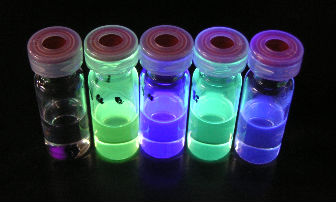The Effective Use of Limited Resources and the Creation of Alternative Resources
Through combining organic chemistry, which uses the 2nd period elements of carbon, nitrogen, and oxygen as a warp, and main group chemistry, which uses 3rd period elements or heavier as a weft, we aim to obtain new knowledge in synthetic organic chemistry while discovering new materials useful in both life science and materials science. In the 21st century, the effective use of limited resources and the creation of alternative resources are important tasks entrusted to humanity. We deal with the following topics in the hopes that providing an elucidation of the functions of organic compounds containing high-period elements will prove to be useful information for fields of manufacturing chemistry (i.e., organic chemistry).
(1) Elucidation of the discovery, structure, properties, and chemical reactivity of new hypervalent molecules
Hypervalent molecule refers to organic compounds which contain an atom that possesses valence electrons exceeding the octet rule. In pursuing this topic, we designed new compounds containing group 15 and 16 elements in which the existence of hypervalent bonds was expected while developing new, universal synthesis methods. The resulting compound group shows potential use in organic synthesis reactions; specific practical applications relating to carbon-carbon and carbon-hetero atom bond formation reactions while in the presence of Elements Strategy oriented transition metal catalysts are currently being examined.

(2) Analysis of the formulation and physical properties of functional heterocycles which are deeply rooted in the chemistry of elements spanning the entire periodic table
Many compounds are currently known that are used in medicine and agriculture which contain heterocycles as a structural component. Until now, decisively fewer heterocycles containing heavier period main-group elements have been synthesized when compared to heterocyclic compounds containing nitrogen, oxygen, and sulfur. In addition, systematic comparisons of their properties and chemical reactivities as a result of differences in their component elements have not been conducted. On that note, we conducted our research with the intent of developing new synthesis methods for heterocyclic compounds containing group 13 to group 16 elements. At the same time, we also endeavored to shed light on how differences in the component elements affect fundamental physical properties such as aromaticity, stability, and luminescence, and continue our research with the aim to propose new high-functioning materials (e.g., biomarkers, organic electroluminescence, solar cells).

(3) Practical uses for high-period main block element compounds in bioorganometallics
Tartaric acid antimony (Sb) and gallic acid bismuth (Bi) can be raised as examples of pharmaceuticals containing heavier period main-group elements. However, these are both inorganic compounds. Thus, the fact remains that the current knowledge concerning the biological activity of organic compounds containing heavier period main-group elements is extremely lacking. The number of potential organic compounds is limitless, as one can design and synthesize any number and variety of organic frameworks around the central atom. In this topic, closely relating to the above-mentioned (1) and (2), without getting caught up on any specific element, we will examine the chemistry of elements spanning the entire periodic table. In doing so, we will build a new, comprehensive library on organic compounds containing heavier period main-group elements. Moreover, we are developing chemical biology together with biological researchers, discovering new compounds that exhibit anticancer and antibacterial properties while proactively creating reagents that can be used as tools to further our understanding of life sciences.
